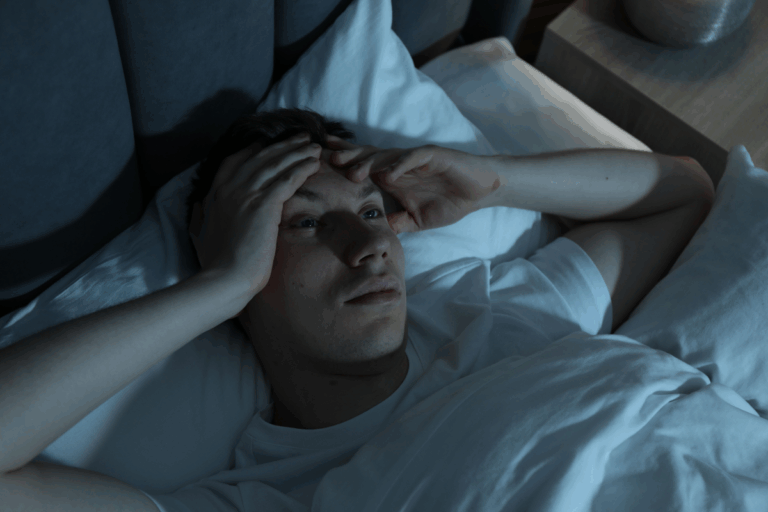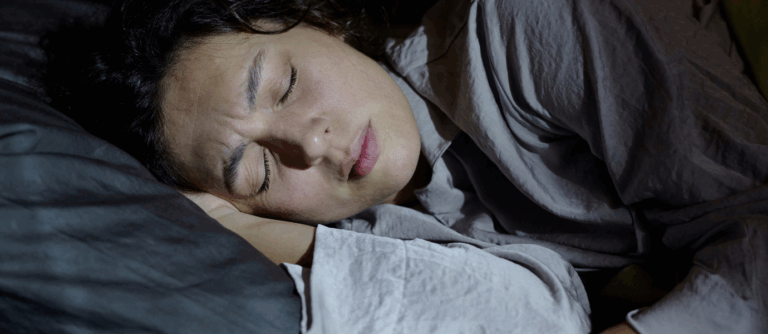
Insomnia is like an unwelcome guest who overstays their welcome. It’s a common sleep disorder that affects millions of people worldwide. Some presentations include difficulties falling asleep, staying asleep, waking up too early and not being able to fall back to sleep, or nonrestorative sleep.
Understanding insomnia and identifying its underlying causes are crucial steps towards finding effective treatment options. Insomnia can be triggered by a variety of factors and recognizing these can help you tackle the problem head-on.
Symptoms of Insomnia
So, how do you know if you’re dealing with insomnia? People with insomnia often experience a variety of symptoms that disrupt their daily lives. They might have difficulty falling asleep at night, and even if they do manage to drift off, they frequently wake up during the night or wake up too early in the morning. This leaves them feeling tired even after a night’s sleep. This can lead to daytime fatigue or sleepiness. Insomnia can also cause irritability, depression, or anxiety, making it hard to keep a positive outlook. Concentrating on tasks, focusing, and remembering things can become challenging, increasing the likelihood of errors or accidents. Ongoing worries about sleep and the frustration of not being able to rest properly are common. If these symptoms sound familiar, it might be time to explore the causes and seek solutions for better sleep.

Causes of Insomnia
Insomnia doesn’t just show up uninvited; it often has underlying causes that cause disruptions in your sleep. Stress is a significant contributor to insomnia. When individuals are overwhelmed by work, school, health, or family concerns, their minds may be too active at night, preventing them from falling asleep. Anxiety disorders, such as generalized anxiety disorder, can lead to persistent worries and fears, making it challenging to achieve restful sleep. Additionally, major depressive disorder (MDD) can cause early morning awakening, difficulty falling asleep due to persistent negative thoughts, fragmented sleep, and altered sleep architecture. Post-traumatic stress disorder (PTSD) often leads to hyperarousal, frequent nightmares, flashbacks, and increased vigilance, all of which disrupt sleep. Attention-deficit/hyperactivity disorder (ADHD) contributes to insomnia through difficulty settling down, irregular sleep patterns, comorbid anxiety, and poor sleep hygiene. Each of these conditions uniquely impacts sleep, exacerbating insomnia and necessitating targeted treatment approaches.

Lifestyle habits like irregular sleep schedules, poor sleep environments, and consuming caffeine or alcohol close to bedtime also play a role in insomnia. Blue light from screens can suppress melatonin, making it harder to fall asleep. Medical conditions such as chronic pain, fibromyalgia, respiratory disorders, cardiovascular disease, thyroid conditions, sleep apnea, among many others, can disrupt sleep as well, and even some medications can interfere with sleep. Understanding these causes are crucial for tackling insomnia effectively.
The Impact of Insomnia on Health
Chronic insomnia can have severe consequences on both mental and physical health. Persistent sleep deprivation can exacerbate existing mental health issues, such as anxiety and depression, and contribute to the development of new ones. Lack of sleep can also affect concentration, memory, and decision-making skills. Insomnia can also lead to daytime sleepiness and impaired cognitive function can increase the risk of accidents at work, home, and on the road. Lastly, chronic insomnia has been linked to negative health outcomes, such as increased risk of heart disease, high blood pressure, diabetes, and a weakened immune system.

Treatment and Management of Insomnia
Managing insomnia typically involves addressing the underlying causes and adopting healthy sleep habits and hygiene. Some effective strategies for treating and managing insomnia are:
- Cognitive Behavioral Therapy for Insomnia (CBT-I): This is a structured and individualized therapy approach that helps individuals identify and replace thoughts and behaviors that cause or worsen sleep problems with habits that promote sound sleep. Clinicians trained in CBT-I generally recommend it as a first line treatment option for insomnia due to its long-term benefits and low risk profile.
- Medication: In some cases, medical providers may prescribe sleep aids for short-term use. However, these are not always a long-term solution due to the potential for dependence and side effects but can be helpful in certain cases of insomnia.
- Lifestyle Modifications: Establishing a regular sleep schedule, creating a comfortable sleep environment, limiting caffeine and alcohol intake, and reducing screen time before bed can significantly improve sleep quality.
Final Thoughts
Insomnia is a multifaceted disorder with various causes, including stress, lifestyle habits, mental health disorders, and medical conditions. Understanding these causes is essential for effective treatment. By addressing the underlying issues and adopting healthier sleep habits, individuals can significantly improve their sleep quality and overall well-being.
Responsibly edited by AI
Other Blog Posts in
Animo Sano Psychiatry is open for patients in North Carolina, Georgia and Tennessee. If you’d like to schedule an appointment, please contact us.
Get Access to Behavioral Health Care
Let’s take your first step towards. Press the button to get started. We’ll be back to you as soon as possible.ecovery, together.




